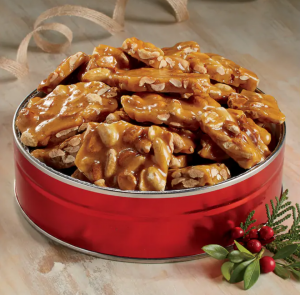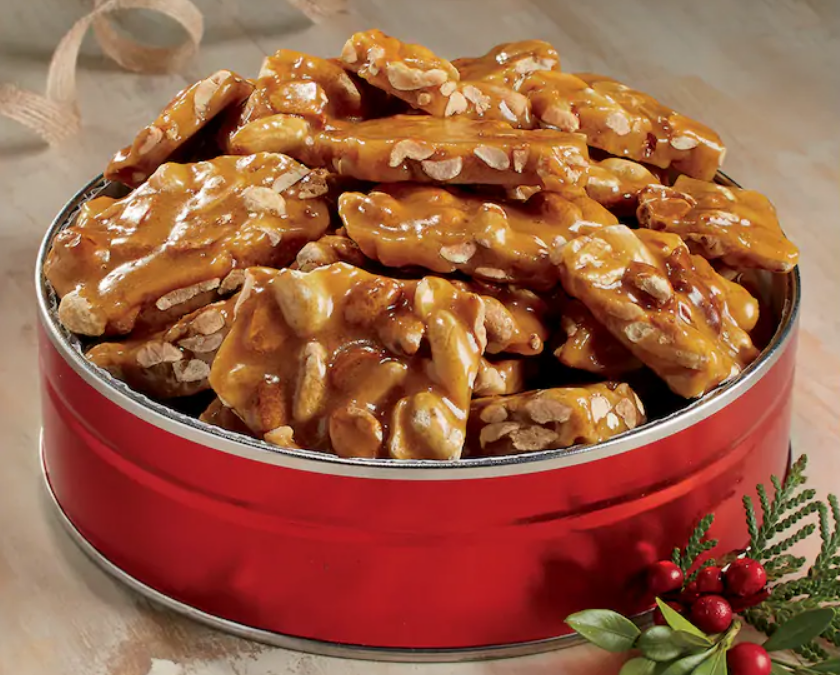The Christmas Candy Conundrum
The Christmas Candy Conundrum
 When I was 12 years old, I took over a paper route delivering newspapers for the Peoria Journal Star. The route included the neighborhood that I grew up in, which consisted of several of my relatives. The first year that I had my paper route, I was pleasantly surprised when I received gifts from several of my customers during the Christmas season.
When I was 12 years old, I took over a paper route delivering newspapers for the Peoria Journal Star. The route included the neighborhood that I grew up in, which consisted of several of my relatives. The first year that I had my paper route, I was pleasantly surprised when I received gifts from several of my customers during the Christmas season.
One of the gifts that I received was a large 3-pound coffee can that was filled with homemade peanut brittle. The gift came from one of my dad’s sisters, Marlene (Honeybee) Miller. All her nieces and nephews called her Aunt Honeybee. I think she was given that nickname when she was growing up because she always stayed as busy as a honey bee.
Aunt Honeybee made the best desserts, caramel candy, and peanut brittle on the planet. When she gave the can of peanut brittle to me, I immediately took it home and hid it in my bedroom. Over the next several days, I only shared it with a few of my brothers and sisters. The peanut brittle was like gold to me because it was one of my three favorite types of candy. My other two favorites were Hershey’s chocolate bars with almonds and Almond Joy bars. Even though it’s been 50 years since I received that can of peanut brittle from my aunt, it’s still one of my favorite types of candy.
The good news is that because I have my own business, there are various companies I do business with that have goodies delivered to my office every Christmas season.
The court reporting service that I use for client depositions always sends a basket full of freshly baked cookies. My landlord always sends a tray of assorted nuts and candy, and the company that we lease equipment from sends a large box of chocolate-covered pretzels. All the goodies that we receive are placed on top of one of the counters in the “copy room” of my office. My staff is always welcome to help themselves to the goodies.
This year, one of the companies I do business with sent a large decorative bag of peanut brittle. When I saw the peanut brittle, my heart sank. Because of my recent jaw surgery, I’m still only able to eat soft foods. While I can handle cookies, the peanut brittle is out of the question.
How could this happen to me?
For the first two days after the peanut brittle arrived, I noticed that the contents of the bag were quickly being depleted. At one point, I couldn’t stand it anymore, so I grabbed the bag and hid it in my office. I’m not sure when I’ll be able to eat it, but I’m not planning on sharing it with anyone.
I know, I know. It’s shameful when a 62-year-old man behaves the same way that he behaved when he was 12 years old. But I don’t care. That’s MY peanut brittle!
There’s one word that describes what a man goes through when he is forbidden from eating his favorite candy: suffering.
In the past, when I’ve written about suffering, it’s been in the context of severe or chronic suffering. But make no mistake about it. When a man’s favorite candy is sitting on a counter calling out to him, and he is forbidden from eating it, he is suffering.
A few weeks ago, I wrote about how suffering is a powerful form of prayer that is, in many ways, more powerful than the prayers that come from our lips. There was a time when Catholics were taught that they should practice what I call self-imposed suffering. Why would anyone want to impose suffering on themselves? Because then they would have the opportunity to offer the suffering to God for their own benefit or for the benefit of someone else.
Self-imposed suffering requires that we practice the virtue of self-denial, which is a virtue that most people are not familiar with. We live in a self-indulgent culture where because of the abundance that is all around us, we are not ordinarily required to sacrifice on a regular basis.
When we don’t sacrifice on a regular basis, we become lukewarm Catholics who are spiritually lazy.
We were warned by God about what happens to those who are lukewarm: “So because you are lukewarm, and neither cold nor hot, I will spew you out of my mouth.” Revelation 3:16.
If you don’t want to be a lukewarm Catholic, you must get into the habit of practicing the virtue of self-denial. The definition of “self-denial” is “the act of not allowing yourself to have or do something you want.”
At the moment, because of the condition of my jaw, I am incapable of eating peanut brittle. While I may be suffering because I have a strong desire to eat the peanut brittle but am unable to, I’m not voluntarily choosing to suffer. But there is still great value when I suffer involuntarily, as long as it’s offered to God for my own benefit or for the benefit of another person.
But my suffering will be even more powerful when I am able to eat the peanut brittle but choose not to because I want to offer the suffering associated with not eating it to God as a sacrifice.
For Lent, during my junior year in college, I gave up all snacks and food that had sugar in them. That was a huge sacrifice for me because I was addicted to sugar. At that time, each day, I consumed several cans of Pepsi. Most days, I ate Trix cereal for breakfast, which was loaded with sugar. I also frequently stopped at the bookstore on campus to purchase and consume a variety of Hostess desserts.
Within a week of abstaining from sugar, I felt much more energetic and alert. That semester, all my classes in accounting and business were 300-level courses. I ended up getting A’s in all those classes. It was the best semester I ever had in college. I attribute my successful semester to my willingness to practice the virtue of self-denial every day, which provided me with the discipline to focus and study when I needed to.
The regular practice of self-denial is like exercise. While it may not ordinarily strengthen the body, it always builds strength and stamina of the mind, will, and soul.
From the moment Jesus was born, He practiced self-denial. He did not have to subject Himself and His parents to the humiliation and miserable conditions that were associated with being born in a cave. He could have easily chosen to be born among royalty. But instead, He chose to live His entire life on Earth as one act of self-denial after another. We conveniently forget that we’re supposed to be imitating Him every day. This is something that we should be thinking about each day, especially on the day that we celebrate His historic birth.
I just reread what I wrote and realized that when my jaw has healed to the point that I’m able to finally eat my peanut brittle, if I practice what I preach, I still won’t be able to eat it when I want to. I’ll have to deny myself of the pleasure of eating it, choosing only to eat it on periodic occasions. Not that’s suffering.
It’s not easy being a devout Catholic.
Oh well, at my age, by the time I can finally eat my peanut brittle, I probably won’t even remember where I hid it.
Merry Christmas!





2 Comments
What a great teaching. Self denial. A tough lesson. You have inspired me to do this more often. Thank you, Harry.
Sacrifice. What a strange word. When we apply it to ourselves, it is very good. When we turn it around and say human sacrifice, it is very bad. Thanks for giving us the good perspective on sacrifice.